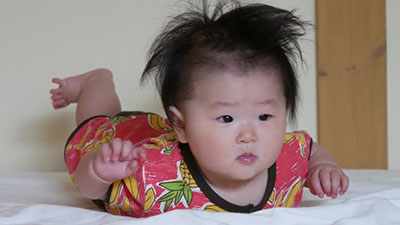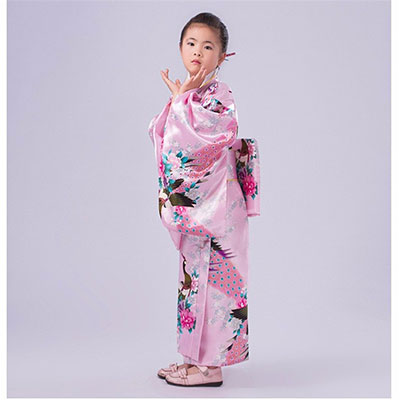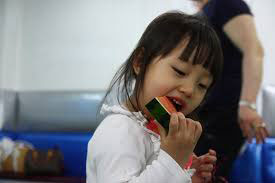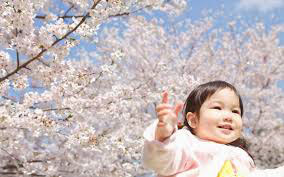Just like it happens in most other cultures around the world, Japanese female names tend to be related to positive aspects only. From flowers, love or beauty, the Japanese people want to make sure that they are making all they can to give a good life to their sons and daughters.
When it is time to name your baby, you may have a lot of doubts. After all, there are a lot of different and beautiful names. While some parents tend to leave this decision to when they are holding the baby in their arms, other parents like to do a good research for the best names they can give their sons and daughters.
If you are a fan of the Japanese culture and if you like the way they tie positive aspects to their names, maybe you should take a look at the best Japanese female names.

When you are looking at Japanese girl names, you will notice that some are very similar. In addition, you will be able to see a lot of Japanese girl names that include two different suffixes; the “ko” and the “mi”. While the first one refers to the word baby, the second one means beauty.
One of the things that we are seeing more and more parents doing is that they try to discover the meanings of the different names they like. This ensures that they are giving their son or daughter not only a name they like but also a name that has a good meaning.
Discover the best list of names website.
In the old days, according to the Japanese culture, Japanese female names tended to be simply regular Japanese words. Some of them include cherry blossom or Sakura, apricot or Anzu, snow or Yuki, or even peach or Momo. However, since they were getting very common, they just went out of fashion.
The truth is that looking at the Japanese female names we can say that there is a blend between the old days with regular words and the more modern days with the suffixes. But the new trends don’t end up here yet. The truth is that in the last couple of years, Japanese parents have been naming their daughters with extremely short name. These include names such as Rio, Aoi, or Rei, just to mention a few.
Another recent trend that is being adopted by Japanese parents is to name their sons and daughters with names that stand out. So, what they are doing is simply gathering some letters and putting them together so it sounds good. So, there isn’t any meaning attached to these new Japanese female names.
With more people showing interest in the Japanese culture, it is normal that we start seeing some of the Japanese girl names being used in the Eastern as well.
So, what are the most known Japanese girl names and meanings?
After a lot of research, we figured out the most known and used Japanese girl names and meanings. We are going to start with the Japanese girl names and meanings that start with vowels, and we will then move on to the Japanese girl names and meanings that start with a consonant.
#1: Letter A:

Ai – It’s a very popular short name and it means love
Aina – means sight or view
Aia – means the ruler of the house, the one who is famous
Aimi – this is the name of a handball player and of a famous Japanese pianist
Ahmya – means black rain
Akari – means light
Akiko – this has different meanings. It can mean brighter light, bright child, queen, superior, and peaceful.
Aika – the name of a Japanese singer
Ainu – the Goddess of Fertility
Akito – this is a unisex name and it’s someone like the autumn season. It’s a bright person.
Aiko – means a loving child or a beloved one
Aiya – means beautiful silk
Amaya – means night rain
Annaisha – means someone who is a good guide for others
Akiara – another unisex name that means a bright person
Airi – this is one of the most popular Japanese female names. It means affection and love.
Akane – means deep red
Akahana – means a red and bright flower
Akira – means clear or bright
Aki – it’s a unisex name without any meaning
Asa – means born in the morning
Aratani – means precious stone
Atsuko – means an honest and sincere child
Aoi – this is a tall Eurasian plant that usually has large flowers
Asuka – means tomorrow
Asami – means morning beauty
Ami – this name has a lot of meanings. They include truth, beauty, sea, and friend.
Asuga – means change like the wind
Au – means meeting
Ayako – means cute baby
Aneko – means older sister
Ayeka – means someone with an analytical and quick mind
Ayumi – means pleasure, peaceful, or history
Ayane – means a wonderful and colorful sound
Aya – refers to an angel who knows magic
Ayame – this is a fictional character of a cheerful and young woman
Ayaka – means colorful flower
Anzu – means apricot, which is a very soft and delicious fruit
Take a look at the best black baby girl names to consider in 2018.
#2: Letter E:
Etsuko – means joy
Emi – means a unique, picturesque and beautiful smile
Etsudo – means child and joy
Ena – means a present from God
Eshima -means the real intention
Emica – means beautiful, blessed or charming
Etsu – means delight
Emiko – refers to a smiling and prosperous child
Eri – means clever, love or blessed child
#3: Letter I:
Iwa – this is a popular Japanese name and it means rock
Iku – means nourishing
Ito – means thread
Isamu – means vigorous
Ima – means now
#4: Letter O:
Okimi – refers to a shining bright light

Orino – means field
Okemia – it means a war horn, pity or mercy. It is a variant of Cornelia
Oki – it refers to the master, the champion in all areas
Oishi – this is an Arabic word that means a respected and noble person. It also tends to refer to a great personality
Ohta – this is a unisex name and it means that it’s free from impurities and dirt
#5: Letter U:
Utano – means field of songs
Umi – means blossom of plum
Uta – means song
Umi – means ocean
Now, let’s check out the Japanese girl names and meanings that start with a consonant:
#1: Letter B:
Bashira – it refers to the predictor of good news and it’s also associated with joyful
Botan – means long life
#2: Letter C:
Chiyoko – means a thousand generations
Chuya – means clear or pure like water
Chieko – refers to a wise child
Chiaki – means sparking light
Chiasa – means one thousand mornings
Chinami – means one thousand waves
Chouko – is usually associated with butterflies but it overall refers to the insects that feed on the nectar of flowers
Chizue – means durability, endurance or long life
Chihiro – means a thousand springs
Cho – means butterfly
Chika – means dear and near
Chiharu – this is a unisex name and it refers to clear skies and springtime.
#3: Letter D:
Doi – this is a unisex name and it usually refers to the earth or to the mountain
Dai – means great
Danuja – another unisex name that refers to a ruler or a knight
Den – means shelters
#4: Letter F:

Fumiko – means a beautiful and wealthy child
Fuji – means shrub or wisteria
#5: Letter G:
Gina – means silvery
Gen – means spring
#6: Letter H:
Haruhi – refers to the flowering, blooming and overall spring season
Hanako – means blossom
Hachi – this is a unisex name and it can be translated to eight. However, it also has other meanings such as flowerpot or bee
Harumi – means clear weather, beauty or spring
Hanami – means beauty, flowery and viewing the flowers
Haia – means quick or nimble
Hanae – means flower, blossom, favor or blessing
Haruka – means distant or far off
Hibiki – means echo
Hatsuko – refers to the firstborn child
Hana’ – means blossom and flower
Hikari – means shining and light
Haya – means quick
Hide – means excellent
Haruki – means radiant spring, shining life, radiant or shining brightly
Hikaru – means light shining
Hekima – means wisdom
Hayami – refers to an unusual and rare beauty
Hoshi – means star
Harue – means sunshine or spring. It is a unisex name.
Hitomu – another unisex name that means beautiful, intellect, and wisdom
Humiya – means healthy
Hideyo – means superior generations
Hiro – means prosperous, tolerant, generous, and abundant
Hatsumomo – this refers to the firstborn peach
Haru – means sunlight or springtime
Homura – means flame or fire
Hotaru – means firefly
Hoshiko – means star
Hisano – means everlasting or long-lasting.
Hiriko – means generous
Hina – this is a very common Japanese female name and it means sun
Hatsu – means firstborn
Hiroko – means generous child
Hisa – means long-lasting
Hinata – refers to a sunny place, to a sunflower, or facing the sun.
#7: Letter J:
Junko – means a pure, genuine, obedient, and sincere child
Jun – means obedient
Jin – means tender
Jona – this is a unisex name and it is often associated with an admirable and loved person among their family and overall society
Japana – this is another unisex name and tends to be associated to someone with ambition, drive oriented and with a lot of energy
Julieanne – this name refers to people who ate noble, kind, honest, and loyal.
#8: Letter K:
Kaoru – means fragrant and is a unisex name
Kagami means mirror
Kairy – means sea
Kano – means skill
Kaiyo – means forgiveness
Kana – means powerful, the one who has all the power
Kairi – this is a unisex name and it refers to an ocean village
Katsu – means victorious
Kaori – means fragrance
Kagome – means lost
Kameyo – means long-lasting
Kazue – means branch
Kasumi – mans mist
Kame – it can refer to a tortoise or to a long-lasting life
Kazashi – means hair ornament
Kerriann – refers to the yellow Japanese rose
Katana – means sword and is often referred to as honorable
Kaiya – means forgiveness
Kaida – means little dragon
Kayo – means the beautiful generation
Kichi – means fortunate or lucky
Kimika – means noble
Kaede – means maple leaf
Karou – means fragrant
Katsuki – means moon
Kei – means wise, blessed or a square jewel
Kiku – means chrysanthemum
Kayda – refers to someone who looks like a little dragon
Katsumi – means victorious beauty
Kata – means worthy
Kioka – means mirror
Kishi – means long life and happy
Kita – means north
Kazumi or Kazuko – these were both very popular names in the past. They refer to harmony and beauty
Kiko – means hope
Keina – means prosperity
Kimmi – means righteous
Kirika – means natural beauty
Keiko – means a happy or joyful child
Kiaria – means a lot of fortune
Kin – this is a unisex name and means golden
Keon – means pure beauty
Kazane – it refers to the sound that the wind makes
Kiwa – means borderline
Kuma – means bear and is another unisex name
Koharu – means heart
Ko – means baby
Kiyoko – means clarity or pure
Kimi – means the beauty of the century
Kimiko – refers to a valuable child
Kitiara – means the blade from the north
Kyou – it’s a unisex name and it means capital city
Kyoto – means mirror
Kohaku – is a unisex name and it means amber
Kozue – it refers to a tree, more specifically to the Chinese black pine
Koko – means stork
Koemi – means smiling
Kura – means house of treasure
Kyoko – means mirror
Kuri – means chestnut
Koto – means a beautiful harp
Kukiko – means snow
Koge – refers to a scented flower
Kozakura – refers to the cherry tree
Kumi – has a double meaning. It can mean nine seas or simply beauty
Kosuke – means the rising sun and it’s a unisex name
Kyo – means unite or village and it’s also a unisex name
Kumiko – refers to a companion child
Kohana – means a little flower
Kioko – refers to a happy child
#9: Letter M:
Madoka – this is a very common surname in Japan and it means circle
Mameha – this is the name of a Geisha
Maiya – means rice valley
Machiko – refers to a fortunate child
Makiko – refers to a child of someone who is true
Makaira – refers t someone who brings happiness
Maru – means round
Mai – means flower or brightness
Maho – refers to an honest person, someone who always tells the truth
Mamiko – means beauty
Marri or Mari – means an elegant ball or dance party
Maemi – means a truthful smile
Maeko – refers to a child of truth
Masae – refers to someone who is blessed with elegance
Masumi – refers to the true beauty and purity of a woman
Manami – means love of beauty
Masako – refers to an honest child
Majime – means earnest one
Maiko – means dancing child
Mao – refers to a genuine and real girl
Mako – refers to someone who is truthful and grateful
Mariko – means circle
Michi – this is a unisex name and it means an upright path
Miki – means flower stem
Minako – means beautiful baby
Makoto – it’s a unisex name and refers to a sincere person
Mieko – means the brightness of the light
Misao – means fidelity
Minami – refers to someone who lived in the south area
Matsuko – means pine tree
Masumi – refers to an increasing beauty
Maki – another unisex name that means true
Mikan – means tangerine or orange
Mitsu – means light
Mine – means peak
Miyah – means temple
Mitsuki – refers to the beauty of the moon
Mio – means a beautiful thread or a beautiful cherry blossom
Mie – refers to a 3-way division
Michiko – means child on morals
Miyuki – has different meanings. It can mean happiness, beautiful reason for history, deep snow, or beautiful fortune
Mikka – means three days
Mayumi – refers to a girl of true beauty
Mayuko – refers to a child of Mayu
Mihoko – refers to a child of shielded loveliness
Misako – it has different meanings. It can mean sand, beautiful sea or even a fascinating child
Miho – means care, beauty, and truth
Mikasa – it can mean both to resolve as well as 3 hats of bamboo
Midori – means green nature
Mikie – means the main branch
Miku – means a beautiful time or a beautiful sky
Mitsue – means a bright ray or a shining light
Miyu – this one has a lot of meanings. These include light, sea, reason, deep tenderness, and beauty
Miu – means a beautiful feather
Misaki – means a beauty bloom
Mirai – means future
Mie – means triple branch
Miyo – means beautiful generation
Muika – means 6 days
Mon – means gateway
Moe – refers to the unmarried girl or to the Holy Virgin
Mura – means from the village
Miyo – refers to a charming and beautiful child. It is a unisex name.
Mizuki – refers to an auspicious hope or to the pleasant and beautiful moon
Miya – refers to a beautiful temple or to a sacred house
Momoko – has a double meaning: it can mean hundreds of peaches or numerous children
Miwa – it can mean 3 rings or harmony or beauty
Miyu – means beautiful gentleness or beautiful truth
Moriko – means a child that hails from the forest
Morina – means forest town
Momo – means peach
Miyoko – refers to a beautiful child of a beautiful generation
Morika – means fragrance of the forest
Momoka – means hundreds of flowers
Momiji – means red leaves
Morie – means beach or bay
#10: Letter N:
Nana – means seven
Nakano – this was a famous female warrior
Nara – means oak tree
Nozomi – means hope
Nanako – refers to the child of the greens
Nao – means honest
Natsuki – this is referred to the bright moon or to the green vegetables, plants, or fruits
Nagi – means a calm person
Narumi – means beauty
Nori – means tradition
Nikaio – referred to people who belong to Daimyo, Japan
Naoko – is referred to a submissive and respectful child
Nanami – means wave men or seven sea
Namika – means flower of the wave
Namie – means little help or blessings
Norita – means decreed act, law and tradition
Nisbett – means trustworthy, dependable, and reliable
Natsumi – refers to the people who make the summer season pretty
Nariko – means a soft or gentle child
Nishi – means west
Noriko – means regulations, rules, instructions, commandments
Ne – means a musical instrument or simply sound
Nyoko – means treasure
Natsu – means a very warm season of the year and is a unisex name
Natsuko – means a summer child, yearning, and reminiscence
#11: Letter R:
Rei – means a lovely and beautiful bell
Rai – means trust
Riko – means lavender child and is one of the most popular names among Japanese girls
Risa – means growing flowers at home
Rikka – means rich and powerful ruler or dominant ruler
Rieko – refers to the baby of Rie
Raku – means pleasure
Rui – means affectionate
Rini – means little bunny
Ruqa – refers to someone who is a bright blue flower
Ruri – means emerald
Reiki – this is a unisex name and it means practicing the healing the spirit
Rumi – means the beauty of the lapus lazuli
Rio – means cherry blossom
Rika – means fragrance
Ren – this is another unisex name and it means the love of the lotus
Ran – means water lily
Ryoko – means good child
Rin – this is a very popular short name in Japan and it means dignified
Rikona – means intelligence
Rie – means value and blessing and is a variant of Ria
Reiko – means grateful
#12: Letter S:

Sachi – means blessed
Saki – means hope plus blossom and it’s one of the most popular Japanese girl names in the younger generation
Sada – refers to the woman who is pure
Saeko – means a serene child
Saori – means the color of the sand
Sakurako – means the child of Sakura
Sakura – means cherry blossom
Sakiko – means blossom child
Sadako – refers to a child who is full of integrity
Sadashi – means ambitious
Sai – means intelligent
Saku – this is a unisex name and refers to the remembrance of the Divine
Sanyu – means happiness and is another unisex name
Sayaka – means clear
Satomi – means beautiful
Saiua – means ripe fruit
Sachiko – means happiness or child of bliss
Satchiko – means lucky baby
Seika – means pure summer
Sen – means fairy of wood
Sawako – means cute baby
Sango – means coral
Seina – means noble baby
Sakae – means prosperous
Sakai – means to live in prosperity
Sajonara – means farewell
Shika – means deer
Shaiwase – means happiness
Sayua – means something who is incredibly fast
Seina – means clean child, fine child, blue child or holy child
Satsuki – means May
Saory – means a nicely woven cloth
Shigeko – refers to a child who has everything she needs
Shizu – means clear
Satoko – means wise baby
Seijun – means pure
Seiren – means a smelt or refined star
Shiko – refers to a woman made of stone
Sayuri – means small hometown, early lily, small lily, and reason, assistant, hometown
Shiori – means weave, poem or guide
Shynah – means a victor
Sorano – means on the sky
Someina – means intelligence
Shinju – means pearl
Sora – refers to someone who is just like the sky
Suzuki – mans bell of wood
Sumiye – means a smart girl
Sueko – refers to the youngest child in the family
Shinon – this is a flower and it means remembrance
Shiho – means sail or will
Subaru – refers to someone who unites others and is a unisex name
Sushi – this is referred to the vinegared rice that is very famous in Japan
Sugi – means cedar tree
Shion – refers to someone who doesn’t forget
Sumiko – means the beautiful child of goodness
Sunako – means the dark side or the sand child
Shun – means a talented person
Suzue – means a branch of little bells
Sumire – means a beautiful violet
Suzume – means sparrow
Suki – means loved one or beloved
Shoko – refers to a little child who is auspicious
Shino – refers o a woman who seems a stem of bamboo
Shinobu – means to support
#13: Letter T:
Tami – means people
Tara Tall – means honorable peregrine
Takako – means a child who is filial piety
Taney – means valley
Tamami – means a beautiful jewel or gem
Taki – means waterfall
Takara – means treasure
Tani – means valley or stand of glory
Tomoe – means being blessed by a friend
Taru – means a huge and vast sea
Tokiwa – means constant
Tamane – refers to the sound of a necklace
Tora – means tiger
Take – means bamboo
Toshi – means mirror image
Tamura – means rice village
Tatsu – means dragon
Tomoko – means intellectual
Tsunade – means confident, someone who is like the young thunder
Tsubane – means belief or acceptation
Tamiqua – means people
Takarra means a precious item
Tomiju – means longevity
Toshiko – means a valued or ancient child
Tamiko means a very beautiful child
Tomo refers to the knowledge or to the intelligence of someone
Tamaki – means bracelet
Taree – means a bending branch
Tsubasa – means extension or section
Tsuru – means wishing for a long life
Toki – means the opportunity timing
Taura – refers to may rivers or lakes
Tatsuo – means female dragon
Tamashini – refers to the soul
#14: Letter W:
Wattan – means homeland
Wakumi – refers to a water spring
#15: Letter Y
Yuna – means gentle
Yoshino – means fertile field
Yori – means reliable
Yui – means superiority or gentleness
Yo – means positive
Yuri – means lily
Yume – means dream
Yoshima – means lucky girl
Yumi – means beauty
Yuina – means vegetables
Yoko – means good girl
Yuka – means fragrant
Yoru – means dark
